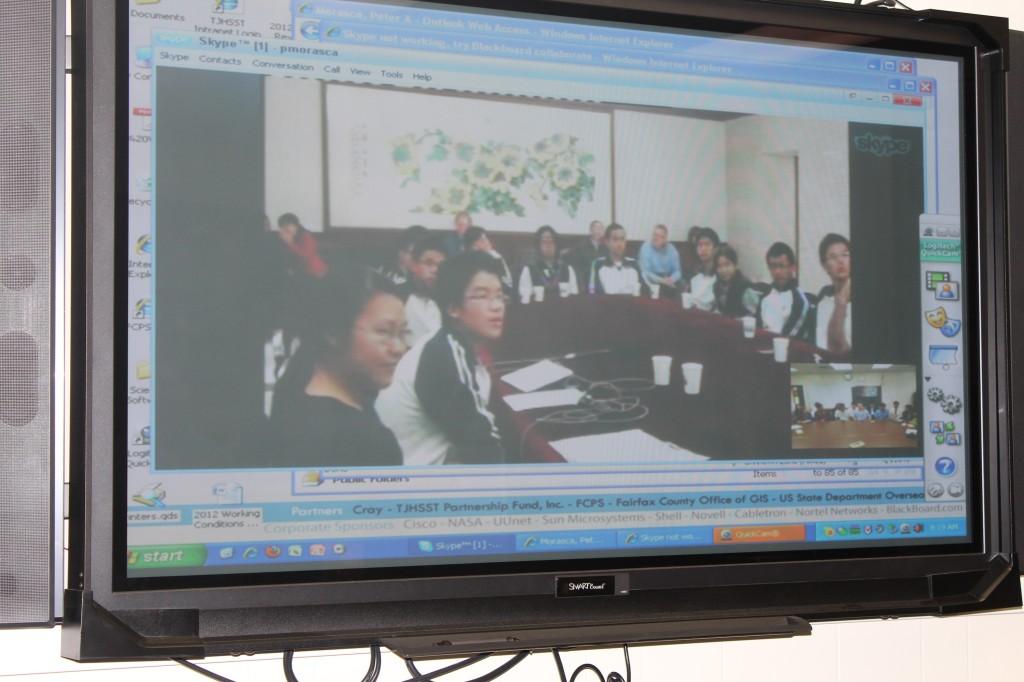Are we really ready to talk to the Chinese?
December 2, 2012
A group of seniors had the opportunity to videoconference with students from China’s Beijing No. 4 High School on Oct. 25. The staff of tjTODAY sat in on the meeting. The forum gave students the opportunity to have an open discussion about political and cultural aspects of the two nations. Many questions posed by the Chinese students selected for this event concerned the portrayal of China in the U.S. election campaign and the future of Sino-U.S. relations.
The U.S. presidential election campaign was peppered with heavy anti-China rhetoric. In particular, Republican nominee Mitt Romney continually vowed to declare China a “currency manipulator,” a label that can lead to tariffs and other consequences for China. The Chinese people, therefore, hoped for President Obama’s victory, if only to sustain the current relationship. As the results came in on Nov. 6, on China’s Twitter-like social media site Sina Weibo, one of the most trending topics of the day was President Obama’s victory.
The U.S. and China have a contentious relationship at times. Though China is a valuable trade partner, the U.S. does not agree with the limits on freedom the Chinese government imposes on its citizens. What the U.S. considers as basic rights, such as freedom of speech, do not exist in China.
However, the U.S. is vulnerable to China because much of U.S. debt is owned by China. Money from China sponsored the auto industry bailout. This gives China power in their dealings with the U.S. In the U.N. Security Council, China is often on the opposite side of issues from the U.S. China vetoes sanctions for Syria proposed by the U.S. Still, China is also dependent on the U.S. for trade.
In this case, how much leverage does the U.S. really have with China? Though the U.S. does not agree with the treatment of Chinese citizens on behalf of the government, is it our role to enforce its values such as democracy onto the Chinese?
Face to face with Chinese students, it is easier to address the relations between the nations on a more personal level. The students from Beijing No. 4 High School did not necessarily express fervent support for American practices or democracy. Some, citing the American system as being “inefficient,” don’t believe democracy is feasible in a country with a population as large as China’s Freedoms the U.S. believes are missing in China may seem inessential or unrealistic to a Chinese citizen.
China’s One Child Policy, one of the prime examples of the Chinese government’s sacrifice of personal freedoms in the interest of the state, was supported by some the Beijing No. 4 High School students because they believe the Chinese population is simply too high.
Perhaps because of the unmatched population size, this combination of communism and capitalist market practices is the ideal structure for China. Though democracy is ideal in America, it may not be viable in China. The U.S. should allow for the people to take action instead of abruptly enforcing its own values. In the Middle East, the Arab Spring protests came from the people; the U.S. had little role in sparking them.
Between students, it is easier to understand the other side’s point of view. Often, when dealing with a country, we lose touch of what the people actually believe. The conference with Beijing No. 4 High School is a microcosm of how the U.S. could negotiate with China in the future. If we change the dialogue and start working towards cooperation, rather than reinforcing competition, the relationship could improve.
It will be interesting to watch the evolution of Sino-U.S. relations during the president’s second term, especially since, just as the president begins a new term, a new leader of the Communist Party will be put in power in China. On a much smaller scale, here at Jefferson, exchange students from Beijing No. 4 High School may be visiting in the spring. Continuing the dialogue with them and understanding both perspectives is a crucial first step to improving Sino-U.S. relations at a fundamental level.
(This article originally appeared in the November 14, 2012 print edition.)






